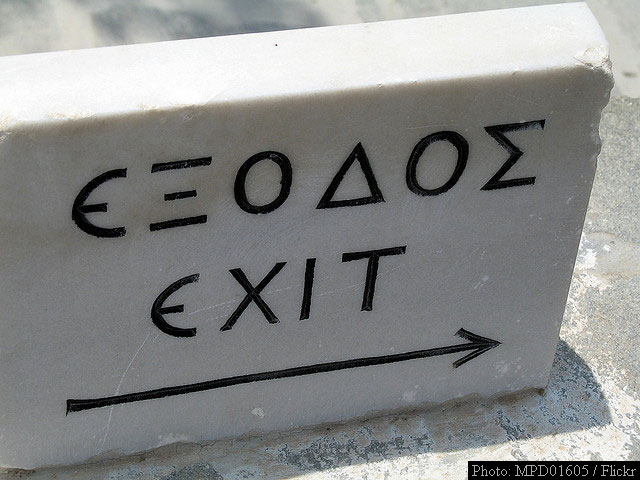
Many people think German Chancellor Angela Merkel and German Finance Minister Wolfgang Schauble are prepared to make an example of Greece in order to reinforce their demand for fiscal rectitude elsewhere in Europe.
I don’t think that’s exactly right. Germany is not trying to make an example of Greece, but it seems perfectly prepared to let the Greeks make an example of themselves. And the Greeks seem ready and willing to do just that.
So while there is always a chance of yet another last-minute deal that pushes the 5-year-old Greek crisis away from its final conclusion, it does increasingly look as though June 2015 will be the month that Athens finally says to its creditors, “ochi pia,” which as I understand it is the Greek equivalent of “no more.”
The Group of Seven meeting that began yesterday did not officially include Greece’s fate on its agenda, but the pending deadline for an agreement between Greece and its creditors means the topic pressed its way to the front all the same. In an interview with Bloomberg, Christian Schulz, an economist with Berenberg Bank in London, said Greece will be “the worry on everyone’s mind” at the meeting.
While Greece has been on European leaders’ minds for some time now, the current urgency is mainly due to that looming deadline: Unless they negotiate a new deal with their international creditors, Greek officials will not be able to pay the 300 million euros their country owes the International Monetary Fund, due June 5. Nor, presumably, the subsequent payments due next month, 1.6 billion euros total.
Greece’s leadership has continued to assure the international community that the country has every intention of honoring its obligations. But unless Greece can reach an accord with its creditors, intentions will be irrelevant, since the country’s pockets essentially remain empty.
Consistent with its philosophy that fiscal rectitude is a luxury that only the 1 percent can afford, the Obama administration, in the corporeal form of Treasury Secretary Jack Lew, wants the Europeans to find a solution that keeps Greece financially afloat and within the eurozone. Lew issued a warning on America’s behalf, urging European negotiators not to “miscalculate” in their dealings with Greece.
“My concern is not the good will of the parties,” Lew said during a stopover at the London School of Economics. But, he added, “a miscalculation could lead to a crisis that would be potentially very damaging.” He suggested that it would be impossible to predict the scope of the consequences if Greece defaulted on its debt.
But ultimately the U.S. has no skin in this game. It will be German taxpayers, and those elsewhere in Europe, who ultimately pick up the tab for Greece’s debts. Greece cannot repay these debts now, and in the absence of major reforms that the Greeks – not just their government, but their electorate – have proven simply unwilling to take, it cannot repay them ever. Once that outcome is clear, there is no other option for any rational lender except to stop shoveling money into a bottomless hole.
As my colleagues and I have written before, the Greeks never belonged in the euro. They never behaved in the manner required of a nation that was part of the eurozone. And there is no reasonable prospect that they will re-qualify for euro membership going forward. The common currency is actually hurting the Greeks, although the euro’s decline this year did help soften the blow by providing some of the devaluation that the country badly needs.
Yes, there will be big costs to a euro exit and a Greek default, most of which will be borne by the Greeks themselves. Lew and others who want to kick the can further down the road point to those costs as a motivation to do so, but they never acknowledge that the costs will simply mount with each additional swing of the leg.
One of the largest non-Greek costs is the example this incident will set for other financially shaky, reform-resistant European nations if they see Greece getting away with siphoning money from German wallets and other equally full ones. The Irish have put their financial house in order. Spain and Portugal have endured hardships comparable to those of Greece, though they still have not fully completed necessary reforms. The Italians and French are even further from facing the global economic reality in which only European countries that maintain sound finances, competitive and flexible labor forces, and tolerable tax burdens that are efficiently administered can compete and prosper. If the Greeks fail, at least let their costly failure count as the rest of Europe’s tuition payment for an education about where such a path ultimately leads.
Lew and the rest of the Americans in attendance will not be particularly helpful at this week’s G-7 meeting. Greece isn’t really our issue, and our advice is neither thoughtful nor useful, especially as far as the Germans are concerned. Yes, economic and market disruptions are likely if Greece falls out of the euro. But in the long run – which is what the Germans, at least, are thinking about – such disruptions are probably a price worth paying for a financially stronger Europe.
As in any classical tragedy, Greeks are responsible for their own choices. There is no saving them from the consequences.
Disclaimer: This page contains affiliate links. If you choose to make a purchase after clicking a link, we may receive a commission at no additional cost to you. Thank you for your support!



Leave a Reply